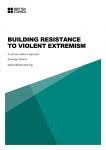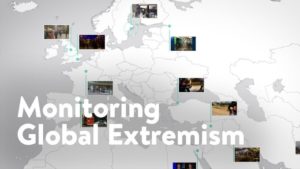 The spread of transnational violent groups is primarily a governance problem. It’s time to start treating it like one, according to Jason S. Calder, head of the Washington office of Saferworld, and Lauren Van Metre, a senior advisor at the National Democratic Institute (NDI).
The spread of transnational violent groups is primarily a governance problem. It’s time to start treating it like one, according to Jason S. Calder, head of the Washington office of Saferworld, and Lauren Van Metre, a senior advisor at the National Democratic Institute (NDI).
The virtual Summit for Democracy did not adequately explore the continuing impact the two-decade fixation on countering terrorism and violent extremist groups has had on fragile democracies even though research and experience demonstrate that the spread of transnational violent groups is primarily a governance problem, they write for Foreign Policy:
 In many so-called fragile states, government institutions are weak. However, in A Savage Order: How the World’s Deadliest Countries Can Forge a Path to Security, author Rachel Kleinfeld [a new board member of the National Endowment for Democracy – NED] cautions that we must be careful regarding our assumptions about state fragility. Some countries do suffer from weak institutions despite efforts to strengthen them. In other countries, however, elites intentionally keep state institutions weak so they can maintain their political and economic privileges. Kleinfeld discusses the impact of “intentional fragility” on security forces and the exercise of violence, but it extends to democratic institutions as well.
In many so-called fragile states, government institutions are weak. However, in A Savage Order: How the World’s Deadliest Countries Can Forge a Path to Security, author Rachel Kleinfeld [a new board member of the National Endowment for Democracy – NED] cautions that we must be careful regarding our assumptions about state fragility. Some countries do suffer from weak institutions despite efforts to strengthen them. In other countries, however, elites intentionally keep state institutions weak so they can maintain their political and economic privileges. Kleinfeld discusses the impact of “intentional fragility” on security forces and the exercise of violence, but it extends to democratic institutions as well.

Source: Institute for Global Change
The Summit for Democracy’s three principal themes—anti-corruption, human rights, and preservation of civil society spaces—take direct aim at the roots and consequences of elite predation which enables the spread of transnational violent groups, Calder and Van Metre add:
- Anti-corruption: …. In demanding greater intelligence-gathering and improved interagency strategies, the U.S. government should prioritize the identification and disruption of privileged networks preying on marginalized groups at the center of violent group recruitment efforts.
- Democratic governance, security assistance, and human rights: …. Earlier U.S. efforts to introduce principles of democratic governance into managing security forces should be resurrected and reinforced by the Summit for Democracy’s human rights commitments. These would end security force impunity in rights violations by identifying and prosecuting abuses; establishing robust checks and balances over the security sector, including expanded interagency and legislative oversight mechanisms; and ensuring civil society and the public are involved in how the government defines and responds to security threats.
- Expanding civil society space: … Internationally supported national action plans (NAPs) to prevent violent extremism and counterterrorism too often side step … restrictions on political rights and further privilege state concerns over those of wider society. Going forward, in line with the Summit for Democracy’s priorities, international actors must confront government restrictions and ensure that not only civil society is included in NAP creation, implementation, and evaluation, but these plans become increasingly centered around governance, rights, and peacebuilding solutions. RTWT







